During the Soviet times Telliskivi, a part of Tallinn, was a “forbidden city“. Only the best scientists, engineers and researchers were allowed to enter and contribute their work to top-secret Soviet military, aerospace and other high-tech projects of the time. Trains would roll into and out from the zone, carrying sensitive equipment and projects from the vast empire.
Telliskivi today is a world unto its own - part post-apocalypse zombie delapidated warehouses, part hipster paradise, part startup jungle; it's a sort of Shoreditch on steroids. There is still a common thread to that Forbidden City of the past – creativity, R&D, high tech is very much a part of what is today called “Telliskivi Creative City“.

My Uber driver and I were both peering out of the car windows with puzzled looks on our faces as we drove through the unusual urban landscape. After a few moments, however, we pulled up in front of an old yellowish facade.
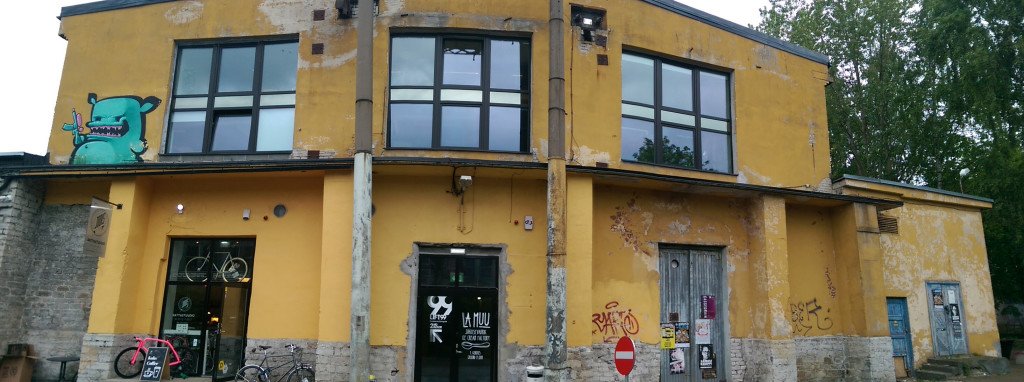
A sign at the entrance said that we had indeed arrived at Lift99, one of the co-working spaces at the heart of the Estonian startup scene. An #Estonianmafia poster was in the ground floor entrance – the Estonians take their “mafia“ hashtag, created on Twitter by Dave McClure years ago, very seriously.
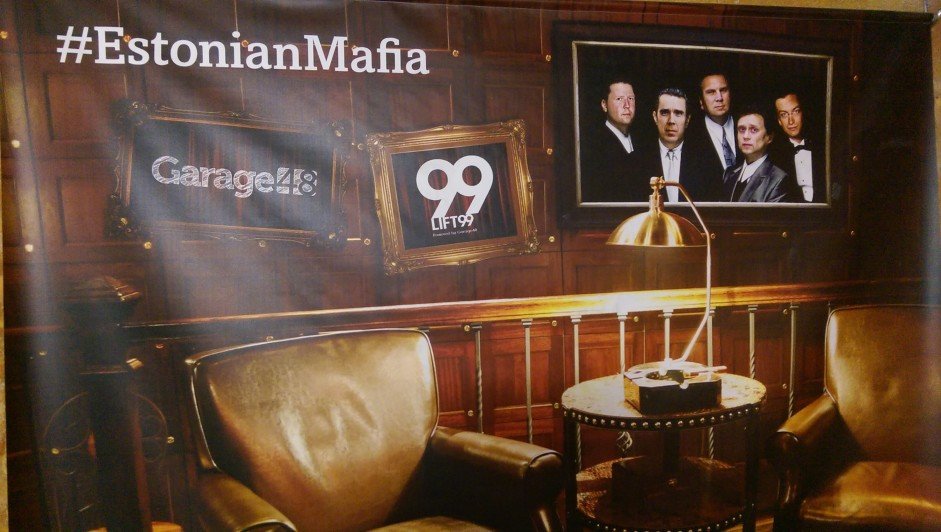
At the first floor entrance to Lift99, visitors are greeted with a sign, politely requesting that we take our shoes off and put on a pair of slippers, provided in ample supply in boxes at the door. I have to admit I hesitated for a few moments... but dutifully complied. Inside, my gracious hostess Karina Univer explained that they wanted to create a warm, home-like atmosphere. It worked!
Lift99 grew out of the highly successful Garage48 initiative and was very much devised and bankrolled by Ragnar Sass, one of the co-founders of Pipedrive (more on Pipedrive later in the article). The walls of the creative space are adorned with pictures of famous people who had something nice to say about Estonia.
I saw a quote from Ernest Hemingway, saying (I quote from memory) “No well-run yacht is complete without at least two sunburned, salt bleached-headed Estonians.“ At first I thought this was some joke, but Karina assured me it was indeed a quote from Hemingway. Later this summer, by coincidence, I took it upon myself to re-read Hemingway's “To Have and Have Not“. Lo and behold, there the quote was, although in full it reads “No well-run yacht basin in Southern waters is complete without at least two sunburned, salt bleached-headed Estonians who are waiting for a check from their last article.“
Aside from providing co-working space, there are tons of events at Lift99, many of them featuring the founders of some of Estonia's most successful startups. In fact, a central wall in the space features the #Estonianmafia Wall of Fame: Starship Technologies, Funderbeam, Toggl, Zeroturnaround, Adcash, Pipedrive, Planet OS, Fortumo, Taxify, Testlio, Transferwise, Lingvist, Monese, Bondora and Skeleton Technologies.

“We will soon be expanding the space,“ Karina explained as we were walking around. “One of the reasons is that more and more international entrepreneurs who are in the e-residency program are actually coming to Estonia, spending time here and this is a great place for them to work and network with the community.“ The expansion is set to triple the capacity of Lift99.
When does a startup stop being a startup, and becomes a “real“ company? Well... perhaps when, like CRM company Pipedrive, it has more than 300 employees in four global locations (Estonia, New York, Lisbon and London) and when it's getting ready to move into its own building (well... technically not “its own“ since startups don't waste money on real estate, but it's still going to say “Pipedrive“ in large letters on the roof, so...). I met with co-founder and CEO Timo Rein and head of marketing Andrus Purde at their current office.

The company raised a fresh Series B round in January - the $17 million round was led by Atomico. AngelPad, Bessemer, Paua and Rembrandt Venture Parners, all previous investors, also participated. What are they going to do with all that money?

“A lot of it is going into further product development.“ Purde and Rein responded. “We are also getting more interest from Asia, specifically from Japan and China, and need to build our capacity and capability to properly service and support our customers in these huge markets.“
Pipedrive has quite a global footprint. Their customer base – 50,000 companies and counting - is evenly spread amongst North American, European and “rest of world“ companies, with each of these areas contributing roughly a third of customers and revenues. A lot of effort and investment is going into localizing the product for numerous international markets.
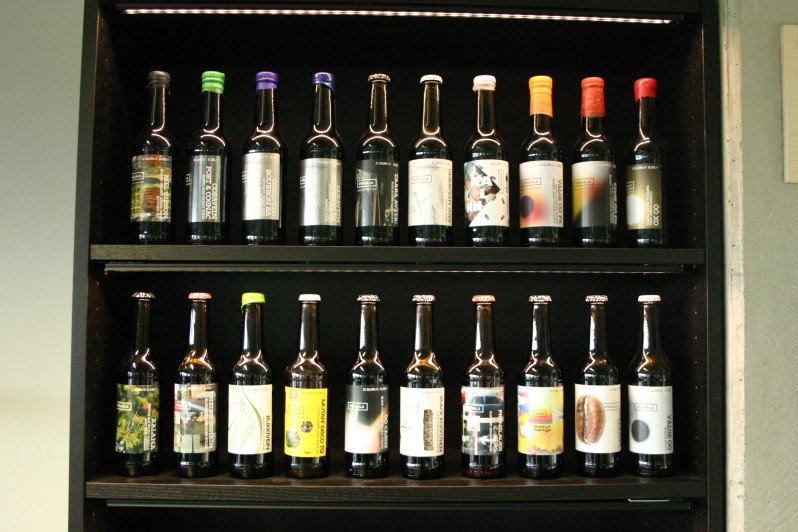
Some years ago Estonia, as well as the rest of Central and Eastern Europe, was regarded as a great place to hire lots of talented engineers and developers. With all the growth and success of companies in the region, it's getting harder to find new talent. My conversation with the Pipedrive team was the first of several where I heard about the severity of this problem in Estonia. In search of a solution, company management decided to go West and set up a development office in Lisbon, currently 20 strong and growing.
So far, the product has been clearly focused and targeted at small and medium companies. With all the growth and investment, I wondered, would there be some pressure from investors to move upmarket and go for the enterprise?
“Yes – we have those conversations from time to time,“ Purde answered – “There is always some initiative to go upmarket. However, we don't have any plans to change our strategy in the foreseeable future. We're very happy where we are right now, with the SME focus.“
Back at Telliskivi, I met a woman on a mission. Kristel Kruustük, CEO and co-founder of Testlio, is passionate about software testing. She and her husband and co-founder, Marko, got their first seed investment and customers by placing third in the AngelHack competition back in 2013 and by getting into the Austin, Texas edition of the highly selective Techstars program.
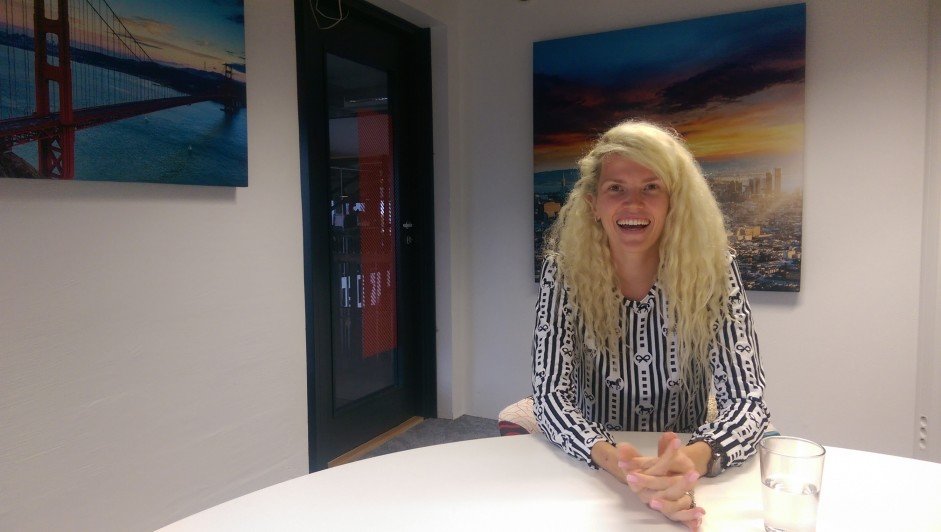
Today, they count some of the world’s largest companies amongst their customers, including Salesforce and Microsoft. In many ways, Testlio is the exact opposite of Pipedrive. Testlio is focused on the enterprise, mobilizing a global network of carefully selected testers to provide testing and software quality assurance services to their customers. Most of Testlio’s investors are US-based (the company has raised more than $8 million to date), as are most of their customers. 20 of the company’s 65 employees are based in San Francisco. The others are spread between Tallinn and Tartu in Estonia.
Kristel and Marko are very careful when accepting new testers into the network – only 4% of applicants are eventually accepted. Will they be looking to actively go after non-US customers or reach out to smaller companies than their current typical enterprise clients? “Not really,” Kristel replied. “We have a lot of room for growth where we are now – in the US and in the enterprise. Our main goal is what we call ‘figuring out the machine’ – in other words, learning how to scale our service delivery to meet demand while continuing to enhance our impact on customers.“
Startups and other high-growth companies have had more and more different funding options and platforms open to them in the past years. Equity crowdfunding, or “crowd-investing“, has been transformed from an “interesting idea“ to a very real opportunity supported by hundreds of specialized platforms and web sites, as well as “mainstream“ crowdfunding platforms like Indiegogo opening up equity investment opportunities. At the same time, large and established stock exchanges are looking into ways to attract and support smaller companies than their usual IPO clients.
Enter Funderbeam – an innovative blockchain based hybrid small cap stock exchange / equity crowdfunding platform. Founded in July 2013 – just around the time Kristel and Marko Kruustük were winning AngelHack and getting into Techstars – Funderbeam's co-founders CEO Kaidi Ruusalepp and head of bizdev Urmas Peiker have nothing if not grand ambitions for the company.
I dug into the details with Urmas at their office, just a few steps away from Testlio in picturesque Telliskivi. Walking up to the office I was greeted on the stairs by a cardboard cut-out Baywatch "babe", apparently ready to rescue any Funderbeam company that might get into trouble.

I have a particular interest in Funderbeam, since Croatia is an important part of their story. The Zagreb Stock Exchange contacted the company early in 2016 and the discussions soon resulted in a joint venture – Funderbeam Southeast Europe (SEE), a project that may very well serve as a blueprint for further international expansion.
“Startups are a large, $130 billion market globally,“ – Urmas explained in an office populated with retro, 60's furniture, oh-so-hipsterish – and continued: “but that's not the limit of our ambition. We want to create secondary investment markets for SMEs all over the world. So we're not talking about billions, but rather about trillions of investment potential. Our transactions are based on the blockchain and our investors are relying on massive amounts of data that we're gathering and will build more of in the future. We see this as the birth of something entirely new!“

His partner Kaidi is a perennial globetrotter. Earlier this year, she spoke at the Tokyo edition of the Slush tech conference. At the conference, she and Taizo Son, chief of the Mistletoe investment firm, announced that Mistletoe would be investing $2 million in Funderbeam, bringing total investment in the company to $7 million. Taizo Son, by the way, is the brother of Masayoshi Son, founder and CEO of Softbank.
We will soon be covering Funderbeam in more detail in a seperate piece for tech.eu, but for the sake of this article I asked Urmas to comment on their experience and expectations from Asia:
“Regulators in Asia are very positive and open to change, supporting the new technological developments which are fundamentally transforming the investment environment such as big data and the blockchain. In comparison, European policymakers are slower, more cautious and as a result Europe is losing its competitiveness when compared to Asia.“
Moving on from investment platforms to team productivity, I had the great pleasure of meeting an old friend - Jüri Kaljundi, founder and CEO of Weekdone. Jüri and I go way back to the heady dot.com days of First Tuesday. That was long ago, however, and I was glad to hear that Weekdone is doing well, albeit following a more careful and reserved growth curve than most of the companies tech.eu covers. They have taken on a relatively modest $290,000 of seed investment, most recently back in 2013, before even tech.eu was launched!

“This autumn, we're celebrating the 5th birthday of Weekdone. What started as a simple weekly team reporting app has now grown into a full-fledge continuous performance management suite. What makes us most happy are two things," Kaljundi told me.
"First, seeing teams from startups to Fortune 500 using us to turn their employees into superheroes using us. The best-practice methodologies of setting and agreeing goals between leaders and employees, monitoring progress and giving feedback and coaching can turn anyone more productive. Our cornerstone OKR - Objectives and Key Results - process is nowadays something almost any successful tech company uses, so it has been an important and rewarding part for us."
"Second, we're an outlier among startups, being profitable since January 2015. I jokingly say that we wanted to do a startup, but made a real company instead. We're now at 11 people, and while some might ask if we could have grown faster, we believe that working hand in hand with happy customers from their cash-flow makes you immensely happy," Kaljundi continued.
"Over the last few years building cash-flow positive startups has been a real change on the market. I recommend to everyone to look at what Bryce Roberts from http://www.indie.vc/ does - like some say, he's the high priest of that movement. And even for Weekdone, we definitely do evaluate each quarter with our founders if we should raise funding, but then for very clear growth acceleration, not for random experimentation. Until now though, we've decided to grow from real customer revenues and positive cash flow.“
My last two meetings were in Tallinn Old Town. In a different world from the somewhat bizarre contradictions of Telliskivi, the Old Town is where all the tourists flock to and is featured on all the postcards, pendants and little fridge magnets sold in the souvenir shops. Still ... amongst the tourists and the “human sculptures“ one can also find some of the Estonian startups – even here!

Annika Ljaš was kind enough to introduce me to several of the people and companies mentioned in this article. We chatted over a glass of wine about the company where she's in charge of marketing. It has a typically humble and not very ambitious Estonian name – Planet OS.
Planet OS supplies big data to energy companies, essentially taking a “pulse reading“ of what's going on on our little blue planet (hence the name) and helping renewable energy companies make sense of it all and base their business and technology decision-making on the data. An example from a partnership program with NASA should make this abundantly clear – the program lets you “Quickly Build and Access Custom Climate Datasets from NASA Earth Exchange Downscaled Climate Projections“. There – I'm sure you didn't even know how much you've been missing until now!
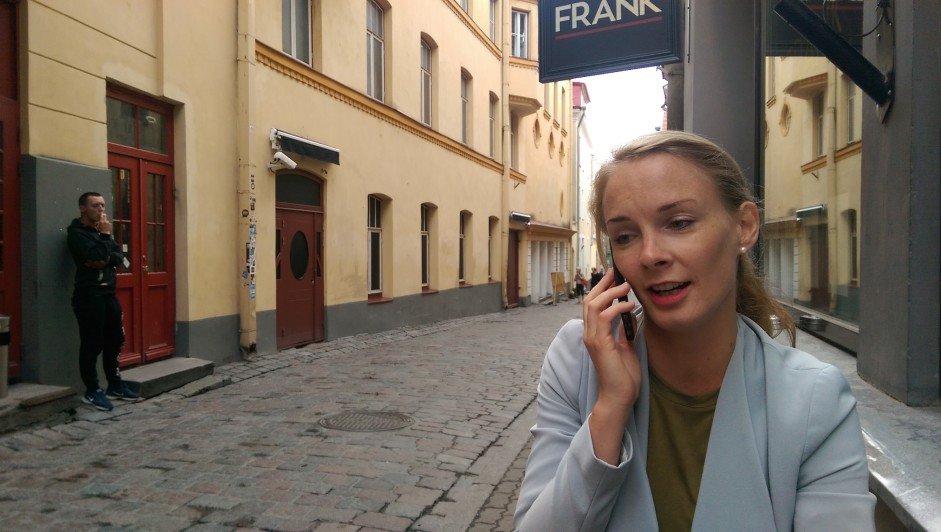
At the time we spoke, Planet OS had raised a healthy $8 million from the German energy giant Innogy SE, Intertrust, Philips and several notable angel investors including Tony Fadell.
The news broke a few weeks after our conversation. On August 8th, Rainer Sternfeld, co-founder and CEO of Planet OS, announced on the company blog that they had been acquired by California-based Intertrust Technologies. Congratulations to Rainer and the whole crew of Planet OS!
The last meeting of my Tallinn trip was with none other than The Don. You might think it's a prank or a nickname but no – this is what it actually says on Herty Tammo's business card. Considering that Herty is a co-founder of the Estonian acceleration program / investment fund Startup Wise Guys, it doesn't sound so strange.

Startup Wise Guys got started back in 2012 – just around the time McClure came up with the #estonianmafia hashtag on Twitter. They have made seventy investments so far, fifty of which are at least “alive“. The fund's most visible exit was the acquisition of agri-tech (“agtech“) startup Vital Fields by The Climate Corporation – a subsidiary of Monsanto.
The Wise Guys tapped into various sources for funding over the past few years, including Estonia's business angels, the European Comission's “FI-WARE“ program as well as a Funderbeam campaign. Currently, Herty and his team are going for their highest funding round so far, including a target of €8 million in Estonia as well as €5 million in Latvia, where the Wise Guys also have a subsidiary.
Tammo and Startup Wise Guys are involved with several Estonian startup and tech initiatives such as the Nordic Founder's Forum and the Estonian “Startup Leaders Club“ with more than 90 members. We talked for a while about the trends he sees as emerging in the current Estonian ecosystem:
“The situation with talent is definitely changing,“ Herty said, echoing comments I'd heard from Pipedrive and others. “It's getting really hard to find enough people with the proper skill sets we need for the current generation of fast-growing companies. That's why the Startup Visa is such an important initiative. Also, as our companies mature and the founders achieve success, more and more of them are giving back to the ecosystem in various ways, from starting co-working spaces to angel investing and the other initiatives we've talked about.“
Rounding out my brief visit to the Estonian capital, I couldn't help but wonder at the people and the companies I'd met and the dynamics of what's going on in this tiny, tiny country. Croatia is very small – merely 4,5 million people, roughly the size of Brooklyn. It's much larger than Estonia though. According to the supreme source of reliable data, the Internet, at the time of this writing Estonia has a population of only 1,305,209.
They may not be many, but the technology community of Estonia is clearly determined to keep their front and center place on the global tech map. And probably somewhere, in some yacht basin, there will be a couple of sunburned, salt bleached-headed Estonians building their next startup far away from home.
Photos: Ivo Špigel
Also read:

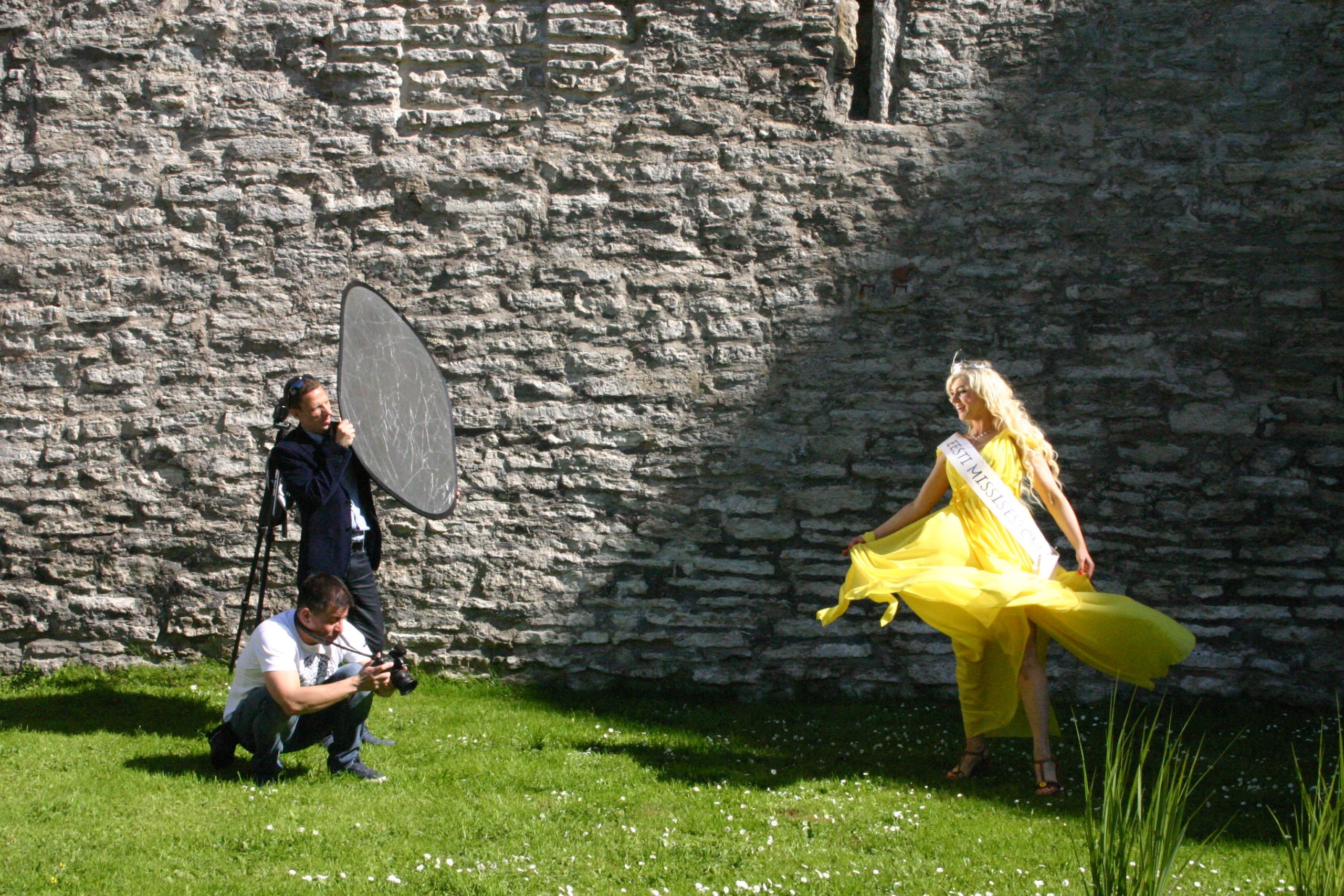

Would you like to write the first comment?
Login to post comments